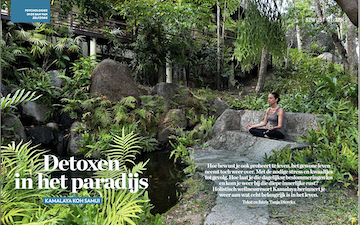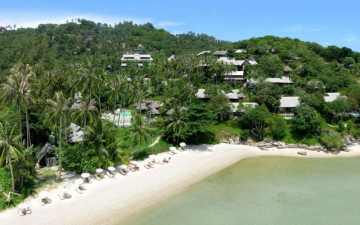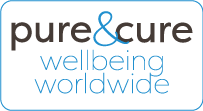Burnout-Recovery Retreats
Insiders tips



Discover all our Burnout Recovery holidays

Relax and restore at Zulal Wellness Resort with programmes that bring back balance and energy through spa, mindfulness and holistic care.

Tap into Bali’s sacred energy with gentle wellness rituals to awaken the senses and support emotional and physical renewal
Restore body, mind and spirit through Balinese healing, energy work and body rituals. A deeply grounding and harmonizing retreat

Release tension and recharge. From short boosters to programmes focused on renewal and vitality, here you will find ultimate relaxation

In need of relaxation and renewed energy? Discover programmes that help you slow down, recharge, and restore balance – bringing more calm, clarity, and lightness into your daily life
In a world full of stimuli and responsibilities, mental resilience is essential. Whether you want to manage stress, improve your focus, or are in need of deep relaxation, here you'll find programmes designed to help you unwind

Unwind and recharge with programmes that restore body and mind through relaxation, movement and nature experiences.
Burnout manifests in various ways, including forgetfulness, difficulty concentrating, frustration, and even physical symptoms such as muscle tension, fatigue, and insomnia. It often impacts relationships, making it harder to connect with loved ones or maintain professional composure with co-workers. Burnout can also strip away your sense of purpose, leaving you disconnected from your goals and passions.
Certain groups, such as healthcare professionals, teachers, and high-performing managers, are especially prone to burnout. Additionally, young professionals are increasingly facing mental health challenges due to external pressures like social media, decision fatigue from too many choices, and a lack of community support. Left unaddressed, burnout tends to worsen over time, affecting every aspect of life.
A Burnout Recovery holiday offers an opportunity to step away from the demands of daily life and focus on healing. These retreats, often recommended by medical professionals, provide a tranquil and supportive environment for rest and renewal. Activities such as yoga, meditation, and therapy are commonly included, offering tools to help you regain balance and rebuild resilience.
Health Resorts, Retreats and Clinics around Mental Balance
In today’s demanding world, mental balance has transitioned from a simple desire to an essential component of a fulfilling life. It represents the harmony between our thoughts, emotions, and actions and serves as the foundation for resilience, clarity, and inner peace. Achieving this balance requires nurturing emotional, psychological, and physical well-being. Explore our diverse range of programs and retreats designed to help you restore your mental equilibrium, reduce stress, improve focus, and strengthen emotional resilience. These retreats cater to various needs, including stress management, emotional healing, and burnout recovery. Time in nature, mindfulness, and meditation are integral elements of these transformative experiences. Mental balance programs are carefully crafted by experts such as psychologists, holistic therapists, medical professionals, and seasoned practitioners. They go beyond relaxation, offering tools and insights to address the root causes of stress and burnout. Alongside nourishing nutrition, these retreats feature relaxing treatments and holistic practices such as yoga, Tai Chi, Pilates, Qi Gong, meditation, acupuncture, and Ayurveda, helping you achieve true rejuvenation and sustainable well-being.
We have listed the various types of mental balance programs aimed at achieving greater peace and tranquility in your mind
1. Anti-stress (or Stress Management) Getaways
These programs are designed to help you reduce stress levels and learn effective techniques to manage stress in your daily life. They often include relaxation exercises, treatments, massages, and stress-reduction strategies. Numerous Health and Wellbeing resorts offer specialized programs centered around stress reduction.2. Emotional Healing Retreats
These retreats provide a safe and supportive environment for addressing and working through emotional issues, traumas, and experiences that can lead to significant life changes, such as divorce, illness, or the loss of a loved one. These programs often include therapy, coaching sessions, and various healing practices. Emotional healing doesn't mean erasing past experiences but learning to cope with them, fostering resilience, and ultimately finding a sense of inner peace and balance. As such, an emotional healing program offers you a new perspective and newfound energy.3. Burnout Recovery Programs
These programs are specially crafted for guests who are grappling with burnout, often stemming from overwhelming work-related stress. They concentrate on recovery, establishing boundaries, self-care, and imparting techniques to avert future instances of burnout. The goal is to enable you to disconnect from daily stressors, focus on your well-being, create and develop strategies to prevent future burnout.4. Reconnecting with Nature
Spending time in nature offers therapeutic benefits for your mental well-being. Health and well-being resorts that focus on nature-based experiences encourage you to immerse yourself in the outdoors and connect with the natural world such as mountains, national parks, lakes, beaches or the countryside. These settings are ideal for activities like hiking, walking, forest bathing, and cycling. Being in nature has a calming and rejuvenating effect on the mind, helping to reduce stress.5. Mindfulness and Meditation
To reset your stress management patterns, begin by identifying the triggers of stress. You can cultivate healthier coping mechanisms, such as deep breathing, exercise, and mindfulness. Meditation, a mindfulness practice, helps you quiet your mind and gain self-insight. This can assist you in effectively managing your stress, confronting challenges, and exploring alternative perspectives. PureandCure offers a range of meditation and mindfulness weekend retreats and short programs designed to teach you how to be present in the moment, reduce anxiety and find balance.6. Unplugging from screens on a Digital Detox
Digital detox programs encourage you to take a break from excessive screen time and technology use. Cutting back on screen time can supercharge your sleep quality and boost your overall well-being. Plus, it paves the way for more vibrant real life connections and relaxation.What is the main difference between anti-stress, emotional healing and burnout recovery?
It is a frequently asked question we receive from our guests. Each program is designed to address various aspects of mental and emotional well-being. The primary distinctions lie in the methods of support and guidance offered during each program.While anti-stress programs primarily emphasize relaxation treatments to relax and unwind, emotional healing and burnout recovery programs incorporate coaching sessions and therapies that are specifically tailored to provide the emotional support that you need.
Emotional healing is a vital process of addressing and mending emotional wounds and traumas. It involves acknowledging and processing difficult feelings like grief, anger or fear. Healing often requires self-compassion, therapy, and mental support. By confronting and understanding the root causes of emotional pain, you can gradually release and begin to rebuild your emotional well-being.
A burnout recovery program is a tailored intense program aimed at helping you to overcome physical and emotional exhaustion caused by prolonged stress. These programs offer a supportive environment for self-reflection and personal growth, emphasizing work-life balance and fostering a sense of community among guests.
Elements of a mental balance holiday
All those programs share some common elements, such as mindfulness practices or relaxation techniques, but the objective, needs and target audience vary. Choosing the right program depends on your specific needs and circumstances, whether it's managing everyday stress, addressing emotional issues, or recovering from burnout.- Healthy eating. During times of stress, it's common to turn to coffee, alcohol, fatty snacks, sugar, and nicotine for solace, albeit understandably. However, these substances only serve to heighten adrenaline levels in the body, exacerbating the turmoil. Conversely, healthy food is a potent ally against stress. Hence, an anti-stress holiday educates participants about adopting a proper, nourishing diet.
- Relaxation treatments and holistic activities. These are integral to a stress management holiday. Practices such as yoga, tai chi, Pilates, qi gong, mindfulness, meditation, acupuncture, and Ayurveda play vital roles in restoring the delicate balance between body and mind, fostering a more tranquil lifestyle. Furthermore, these activities provide a gentle physical component to your wellness journey, grounding individuals who may find themselves excessively caught up in their thoughts.
- Therapy and counseling. Individual and group therapy sessions with licensed therapists or counselors to address specific mental health concerns, emotional issues, and personal growth.
- Nature and Outdoor Activities. Opportunities for nature-based activities such as hiking, nature walks, or eco-therapy to connect with the natural environment and reduce stress.
- Creative and Artistic Expression. Art therapy, creative workshops, or music therapy sessions to encourage self-expression and emotional release.
- Workshops and Educational Seminars. Workshops and seminars on topics like stress management, emotional intelligence, resilience building, self-awareness, personal growth, and reflection. Some place offer personalized assessments to identify your areas of concern and create a tailored plan.
- Healthy Lifestyle Choices. Guidance on making healthier lifestyle choices, including sleep hygiene, exercise, and time management.
Consider approaching your employer for support or accounting these expenses as business costs.
Research demonstrates that engaging in a mental balance program can reduce absenteeism and potentially increase an employee's productivity. This is why employers are sometimes willing to contribute. For entrepreneurs or self-employed individuals, coaching costs can be classified as business expenses and, thus, tax-deductible.

 EN
EN NL
NL BE
BE







